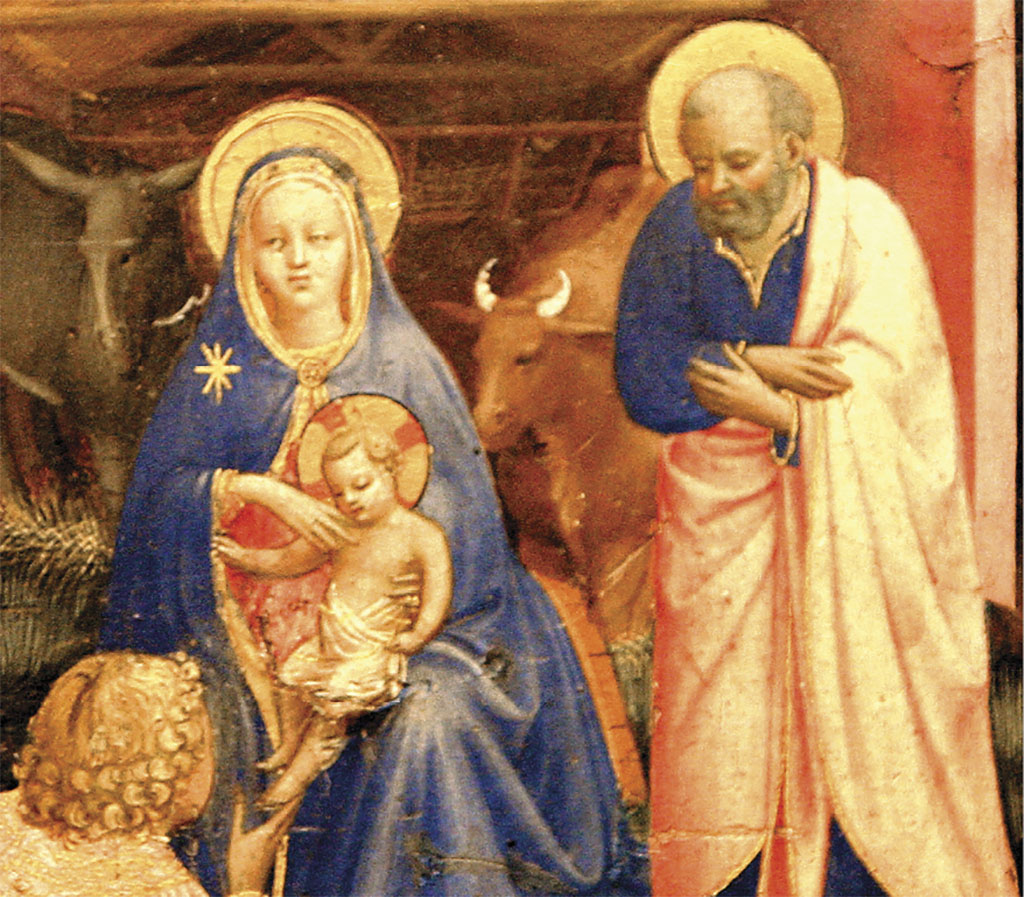Advent
The Two Comings of Our Lord
The circle and the lozenge shape are held as the most perfect geometrical figures according to St. Thomas Aquinas, since they represent the movement of the effect that returns to its cause. Christ is the highest realization of this symbology because, in addition to being the principle of all creation, He is also its ultimate end. Thus we find, at the end as well as at the beginning of the liturgical year, Gospels which transcribe Jesus’ revelations on His final coming.
Penance, in the expectation of Christmas
The Church did not develop its ceremonies based on prior planning. As a supernatural organism, born from the sacred side of the Redeemer, and vivified by the breath of the Holy Spirit, it possesses a special vitality by which it develops, grows, and is beautified in an organic manner. Thus, the liturgical year unfolded over the course of time, in its most diverse aspects. Concretely, Advent emerged between the fourth and fifth centuries as a preparation for Christmas, synthesizing the long anticipation of the good Jews for the coming of the Messiah. The expectation of a great mystical-religious event calls for an attitude of penance. Therefore, the centuries prior to the birth of the Saviour were marked by sorrow for personal sins and the sin of our first parents. The period before the public life of the Messiah became even more intense: a voice crying out in the desert invited all to seek pardon for their sins and to convert, so that the ways of the Lord would be made straight.
Hope pervaded with the desire for holiness
Wishing to create ideal conditions for our participation in the festivities of the Saviour’s Nativity—His first coming—, the Liturgy selected sacred texts related to His second coming: the dominant note of one is mercy, and of the other, justice. However, these two encounters with Jesus form a harmonious whole, joining the first and last effects of one and the same cause. The Church Fathers comment at length on the contrast between one and the other, but they would have us see, in the Incarnation of the Word, the beginning of our Redemption, and, in the resurrection from the dead, its full realization. To be in readiness for the magnitude of the Christmas event, it is indispensable to have before our eyes the last episodes that will precede the Final Judgement. Hence the Church’s former, long-standing custom of singing the famous Gregorian hymn Dies Irae as a Sequence during the Requiem Mass. More than simply recalling the historical fact of Christmas, the Church wants us to participate in the graces pertaining to the festivity, just as they were enjoyed by the Blessed Virgin, St. Joseph, the Magi, and the shepherds. Amidst these events, the chosen people were sustained by a great hope, pervaded with the desire for holiness and for a penitential life. We should imitate their example and follow in their footsteps, as regards not only Christmas, but also the plenitude of our Redemption: the glorious resurrection of the children of God. The first and second comings of Jesus unite on our horizon during this period of Advent, helping us to analyse them from an almost eternal perspective; or better, from within the eyes of God, to Whom everything is present. These are some of the reasons behind the choice of purple for the liturgical vestments used during these four weeks. It is a time of penance. Thus, today’s Gospel fittingly speaks to us of vigilance, for we know not when the “lord of the house” will return. We must take care not to be caught anawares, sleeping.

He came to be judged, but will return as Judge
We should remember that the Lord will not come as Saviour, but rather as Judge; not only as God, but also as Man, as St. Thomas explains: “Christ, even in His human nature is Head of the entire Church and God has ‘put all things under His feet.’ Consequently, it belongs to Him, even according to His human nature, to exercise judiciary power.” “Judiciary power belongs to the Man Christ […] from merit, so that, in accordance with the Divine justice, He should be judge who fought for God’s justice, and conquered, and was unjustly condemned. […] And Augustine says: “The Judge shall sit, who stood before a judge; He shall condemn the truly wicked, who Himself was falsely reputed wicked.”
Our Lord Jesus Christ will be the great Judge, in His most holy humanity, hypostatically united to the eternal and divine Wisdom. He thereby knows the secrets of all hearts, just as St. Paul writes to the Romans: “On that day when, according to my Gospel, God judges the secrets of men by Christ Jesus” (Rom 2:16). He will appear in all His glory, for in His first coming, as He came to be judged, He clothed Himself in humility. Therefore, upon returning as Judge, He will clothe Himself in splendour. St. Thomas5 goes on to say that, for His birth in Bethlehem, the Son took on flesh to represent our humanity before the Father; however, at the end of the world, He will come to mete out the Father’s justice to us; He should, therefore, manifest the glory befitting the emissary of God’s eternal power. This Judgement will be universal, as also was the Redemption. Let us consider the explanations given by St. Augustine regarding these two comings: “Our Lord Jesus Christ, our God and the Son of God, came the first time in a hidden manner, but in the second coming, He will present Himself manifestly. When He came silently, He made Himself known only to His servants; when He comes manifestly, He will appear to both the good and the wicked. When He came hidden, He came to be judged; when He comes with majesty, He will come to judge. When He was accused, He was silent, as foretold by the prophet: ‘he opened not his mouth; like a lamb that is led to the slaughter, and like a sheep that before its shearers is dumb.’ […]. However, He will not remain silent in this way, when He comes to judge. Truly, He is not silent now for those who wish to hear Him; but it is said that He will not remain silent, for then, all will hear His voice, even those who now disdain it.”
A salutary reflection for good and wicked alike
Nothing will be forgotten; all of our least thoughts and desires, actions and omissions, in relation to God, neighbour and even ourselves, will be recalled in all their reality. The Divine Judge will not fail to analyse even the least point; everything will be duly considered. He will then publicly pass an unappealable, definitive sentence on each one. Some will be at His right, others, at His left. Of the latter, how many will be there because they have sought a fleeting pleasure, or refused to make the slightest effort? And we should bear in mind that this dreadful scene of the Final Judgement will be a public repetition of each person’s particular judgement.
On the other hand, what great joy the good will have! “The sufferings of this present time are not worth comparing with the glory that is to be revealed to us” (Rom 8:18). The bodies of the righteous will be liberated from all weaknesses and infirmities; they will be immortal and spiritualized, assimilated to the light of Christ. In seeing themselves united in Mary and Jesus, they will feel inundated with delight and joy on that day of triumph.
This demonstrates how salutary it is, for the wicked and good alike, to look head-on at this second coming of the Lord. Perhaps some will be moved by the fear of God, while others may be heartened, amidst the woes and setbacks of this life, by the expectation of this magnificent ceremony.
Warning signs of the final events
We are now better able to delve into the words of Our Lord transcribed by Mark in today’s Gospel. Chapter 13 is altogether eschatological. It begins with a dialogue between the disciples and the Master regarding the solidity of the edifices built within the precincts of the Temple, eliciting this prophecy from Jesus: “There will not be left here one stone upon another, that will not be thrown down” (v. 2). Evidently, this affirmation whet the curiosity of the Apostles and much questioning ensued as to the timing of these events. Jesus did not reveal dates, but He announced the warning signs: “For nation will rise against nation, and kingdom against kingdom; there will be earthquakes in various places, there will be famines; this is but the beginning of the birth-pangs” (v. 8).
He transmits other signs and counsels to the Apostles in the subsequent verses, culminating in a vivid description of the last events before the final conflagration of the world: “And if the Lord had not shortened the days, no human being would be saved; but for the sake of the elect, whom He chose, He shortened the days” (v. 20). “Heaven and earth will pass away, but My words will not pass away” (v. 31).
At this point in His eschatological discourse, Jesus answers the Apostles’ initial question: “But of that day or that hour no one knows, not even the Angels in Heaven, nor the Son, but only the Father” (Mk 13:32). The Fathers of the Church comment that, by placing Himself among those who do not know, Christ used diplomacy so that the disciples would not be saddened at His unwillingness to reveal it to them; yet it would be impossible for Him not to know, since there can be no difference between the Father and the Son: “Whenever He professes ignorance, it is not because He does not know, but rather because it is not yet the time to speak or to act.”
These are the preliminaries that shed light on today’s Gospel.
Conclusion
In our egoism, we tend to place ourselves at the centre of our attention and concerns, but our Christian life is essentially social: “Love one another” (Jn 13:34; 15:12; 15:17); or: “He who loves his neighbour has fulfilled the Law” (Rom 13:8). Jesus weighs our acts in light of our mercy toward our neighbour; that is, He judges us by a social criterion.
Therefore, let us prepare ourselves, during this Advent, to welcome Jesus Who comes in the fullness of His mercy, and let us beseech the powerful intercession of her by whom He comes to this world, for our second encounter with Him, when He will come unexpectedly in the fullness of His justice.

